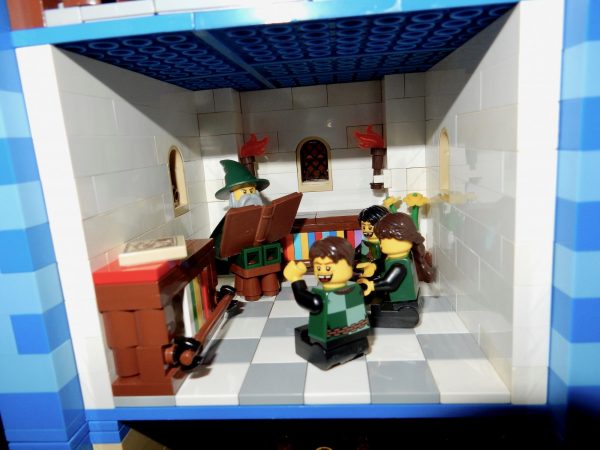Social justice themes can show up in unexpected places. Doug Cloud, assistant professor of English, works them into one of his hobbies: large Lego castle builds. He populates his builds with female knights, villages overseen by two queens, and peaceful pastoral scenery instead of violent battles.
“It’s interesting to see kids read the scene,” Cloud explains. “If I have two queens in a castle, do they ask where the king is? And how do the parents handle that? There’s a little bit of social justice in it. The intent is not to educate people, but just give them a nudge regarding the traditional way we look at a castle scene.”
CSU English professor by day, LEGO enthusiast by night, Cloud’s expertise is rhetoric. And while his Lego creations have not yet made it into his research, it is very clear that in both he challenges expectations and raises awareness. He invites those engaged with his work to imagine other possible worlds, consider other narratives, contemplate multiple arguments -- inviting them to collectively and compassionately construct a new world.
“Rhetorical studies is, at the basic level, the study of argument and persuasion. But I also think of rhetoric as the art of imagining the possible—this is a view inspired by many different rhetorical theorists. Rhetoric differs from pure logic, not in that it is illogical or irrational, but in the sense that it goes beyond describing reality as it is and articulates new and sometimes radical visions of how things could be.”
Doug Cloud earned his BS in Journalism from Ohio University, graduating magna cum laude. He studied journalism because he “loved talking to people, doing the research, taking a complex problem and wrangling it into something coherent that they [the audience] can read and be better informed.”
As it turns out, he loved journalism but not being a journalist. He found that people were suspicious of his motives and kept their guard up, which did not lead to authentic connection or real change. He took a writing workshop as a senior and discovered he loved talking to people about their writing. He appreciated how careful, reasoned use of rhetoric enables you to explain something very complicated and technical to an audience who might not understand it, and how we can use reasoned arguments to change social attitudes over time. With encouragement from a mentor, he went on to earn his MA and PhD in Rhetoric at Carnegie Mellon University. “I actually wasn’t sure that I wanted a PhD, but once I started as a graduate teacher at Carnegie Mellon, and got into the classroom setting, I knew teaching was for me.”
His focus, in his research and in the classroom, is public rhetoric, or more specifically the rhetoric of social change. He is interested in the intersection of arguments, where convincing meets transformation, situated in what Michael Warner calls “poetic world making.”
Public discourse…is poetic. By this I mean not just that it is self-organizing, a kind of entity created by its own discourse, or even that this space of circulation is taken to be a social entity, but that in order for this to happen all discourse or performance addressed to a public must characterize the world in which it attempts to circulate and it must attempt to realize that world through address.
– Michael Warner
Cloud teaches courses in rhetorical and composition theory, style, public writing, and argument. “I believe very strongly in the ‘citizenship’ aspect of the liberal arts. My job is to help students become critical readers and thoughtful writers, the kind of people who delight in difficult questions.” When asked what he enjoys most about his work at CSU, he answers “students, being in a classroom, interacting with students, engaging them with what I’m thinking about in terms of my own current research, working together towards an answer to a question, and they don’t know and I don’t know.”
On the surface, Cloud’s research interests vary – LGBTQ rights, climate change, atheism, the expression of white supremacy in presidential politics – but there is actually a very clear theme: the rhetoric of social change, particularly the representation of marginalized group identities in public discourse.
“I try to impress upon my students, and convey in my research, that good rhetoric isn’t about winning by any means. We must win assent by giving reasons. We must strive toward mutual understanding, not just getting people do to what we want with words. In this way, we (my students and myself) hold ourselves to a much higher standard than politicians and pundits. My interest as a teacher and a rhetorician is to break down in-group and out-group divisions of many kinds. I want to find out how (or if) we can persuade without tribalism and division,” Cloud says.
Cloud’s current projects concern the role of identity in climate change discourse and the transformation of LGBTQ identity categories in public deliberation about military service. His articles have appeared in Argumentation and Advocacy; Written Communication; Reflections: Public Rhetoric, Civic Writing and Service Learning; and the Journal of Contemporary Rhetoric.
When he’s not doing research, writing, and teaching, Cloud writes in a journal every day (“it’s life changing”), hikes (he’s a volunteer ranger with the Poudre Wilderness Volunteers), backpacks, runs, reads (true crime is a favorite), and, of course, is a Lego enthusiast working on large, complicated builds that offer a vision of how things might have been, or of how they might yet be.



